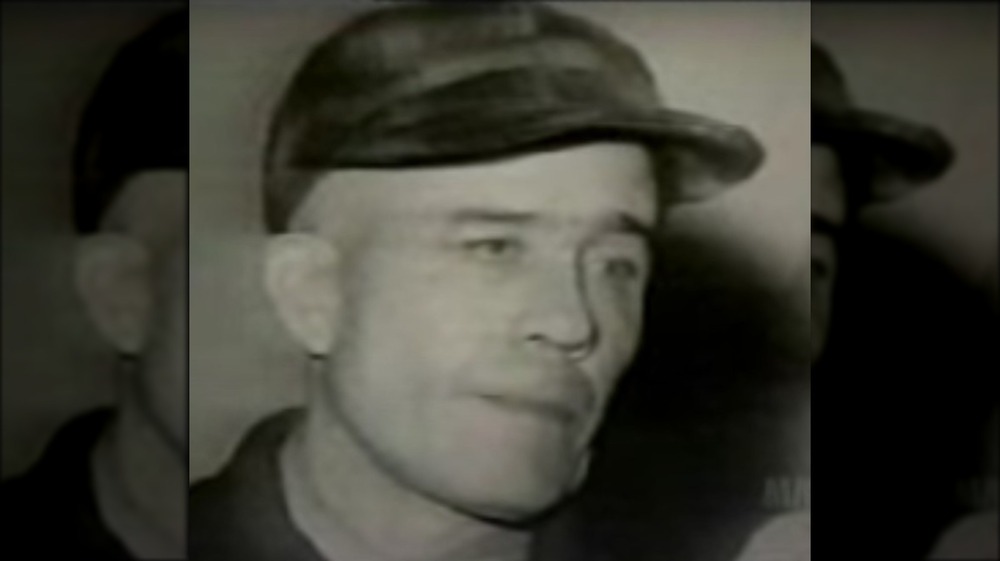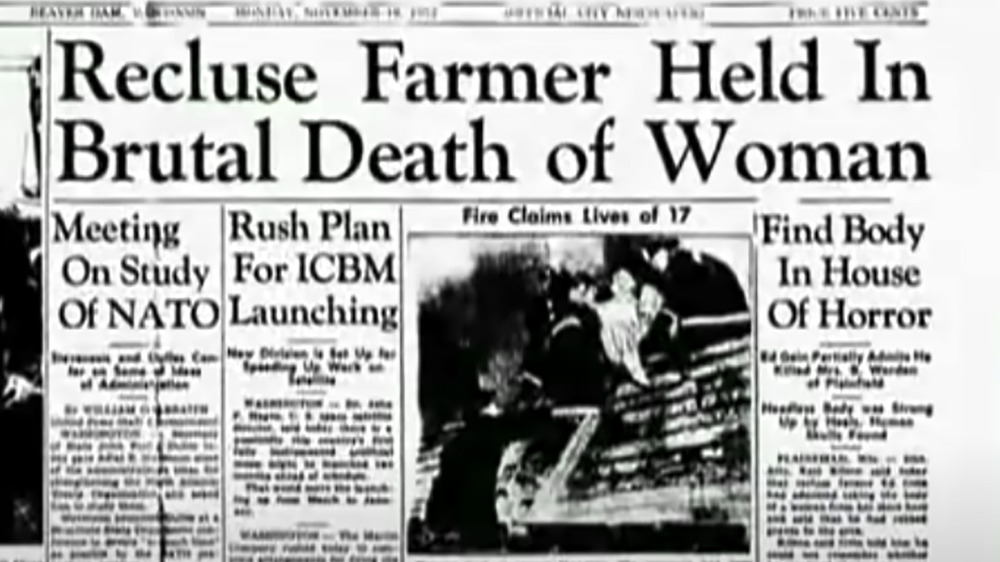How Ed Gein's Religion Influenced His Crimes
Ed Gein, the infamous killer known as the Butcher of Plainfield, died at the age of 77 in 1984. Captured, found legally insane, and institutionalized in 1968, Gein left behind a trail of two murdered people, along with the mutilated corpses of nine other individuals. His story is the inspiration behind the character of Norman Bates in Robert Bloch's 1959 novel, Psycho. And while Norman Bates had his "mother" mentally torturing him in both the novel and Alfred Hitchcock's movie adaptation, Ed Gein had much the same relationship with his mother, Augusta Gein.
Born Augusta Lehrke in La Crosse, Wisconsin, in 1878 (via News.Com.Au), Augusta Gein was a fundamentalist in the truest sense of the word. One of eight born to German immigrants, the Lehrke clan was raised a very strict version of Lutheranism. They believed that every human thought, deed and action was infected with sin. Because of this, they believed humanity was doomed to eternal damnation.
But that's just the beginning for Augusta Gein. In December 1900, Augusta married George Gein. A barely functioning alcoholic who worked jobs as a tanner, carpenter, and an insurance salesman, George Gein had trouble maintaining regular employment. Augusta despised the man, but was trapped in the marriage due to her beliefs. The poison in her mind caused that hatred to grow to include all men. When Augusta became pregnant with her second child, a son, she was determined to raise him differently than the men she encountered on a daily basis.
The real Norman Bates
Augusta regularly coddled Ed, coating him with attention and creating damaging co-dependence within the eventual serial killer. She certainly was successful in her venture of creating a son "all her own," however. As he got older, Ed viewed his mother as a regular deity, worshiping her every word (via Live Local Histories of Wisconsin). As her boys got older, Augusta would preach to both Ed and his older brother, Henry, her strict Lutheran ways, every afternoon. She sermonized on the evils of drinking (using their father as an example and target of contempt), the overall immorality of the world, and how women were prostitutes and agents of the devil, to be avoided at all costs.
And while Ed worshiped his mother's word, he didn't always listen. In 1915, George and Augusta Gein moved the family to a small, isolated farm on the outskirts of Plainfield, Wisconsin. On that farm, Augusta had plenty of rules for young Ed. Neither Ed nor older brother Henry were allowed to leave the farm, except for school. As is common with farm life, George and Augusta regularly slaughtered animals for food. However, Ed's mother forbade both boys to enter the shed where both parents regularly disemboweled animals. On one particular day, Ed broke the rule and snuck into the slaughter shed. According to Ed, he felt himself become aroused as he watched Augusta eviscerate the animal (via News.Com.Au).
Depths of depravity
Augusta Gein regularly verbally abused the boys, comparing them to their alcoholic father, and kept them isolated from friends and outsiders (via Lived Local Histories of Wisconsin). Eventually, as he grew older, Henry would grow tired of the constant preaching, splitting with his mother's ways. Henry died in a rather mysterious fire a few years later (via History) that some believe Ed himself started.
Regardless, with Ed's father passing away in 1940 and Henry's death in 1944, the path had been cleared for Augusta's emotional and psychological noose to get ever tighter around Ed's neck. The mother/son duo wouldn't have much time together, however. Augusta suffered a stroke early in 1945, causing Ed to become further drawn into his mother's depraved world view.
Ed cared for and tended to his mother until her death on December 29, 1945. She was 67. Ed's trip into madness, however, was just beginning.
(Decider reports that Discovery+ will stream the documentary Ed Gein: The Real Psycho beginning April 9.)


